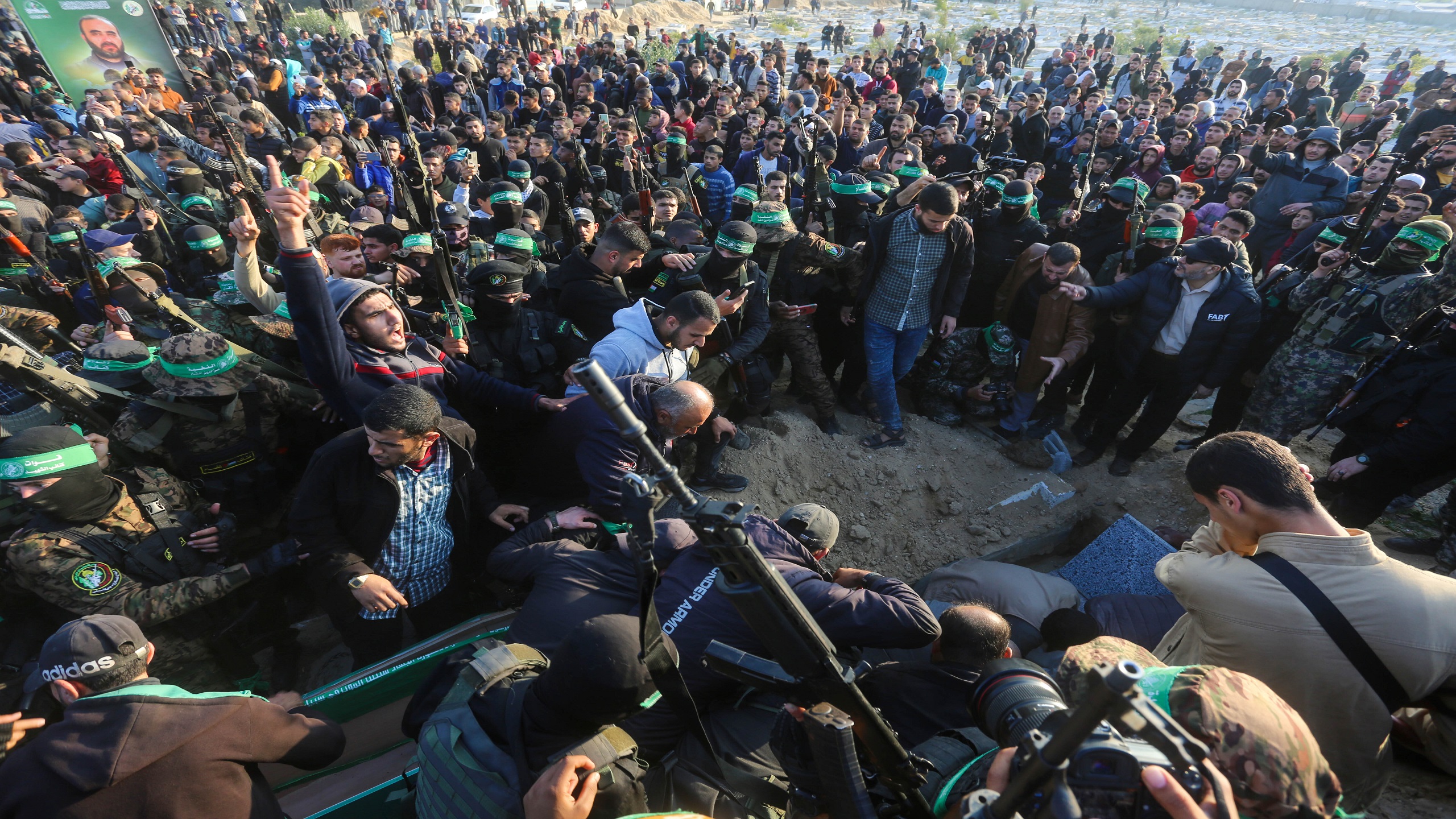Despite 16 Months of War, Hamas Still Rules Gaza. What Are the Consequences?
Middle East analysts question whether Israel can—or will—reignite war against Hamas after the ceasefire deal is complete
The Hamas terrorist organization continues to rule the Gaza Strip and is likely to do so for the foreseeable future, according to several Middle East analysts and experts.
Speaking to The Media Line, Brig. Gen. (res.) Yossi Kuperwasser explained that Hamas remains a formidable force, with “a lot of critical military infrastructure” still intact and tens of thousands of operatives, despite Israel’s military campaign.
A US State Department report published last month indicated that Hamas has recruited at least 15,000 new fighters since the war began—effectively replacing nearly as many as the Israel Defense Forces (IDF) is reported to have killed in battle.
Despite Israel’s targeted assassinations of key Hamas leaders, Kuperwasser noted that the group has leveraged the roughly 1.3 million tons of humanitarian aid that has entered Gaza over the past 15 months to sustain itself.
Author Seth Frantzman of the Foundation for Defense of Democracies observed that large areas of Gaza remain untouched by the IDF, including key sections of Gaza City, the Nuseirat refugee camp, and other strategic locations. He estimated that Hamas still controls about 40% of the territory.
It is going to be difficult to say that we have removed Hamas from its power to rule over Gaza
“It is going to be difficult to say that we have removed Hamas from its power to rule over Gaza,” Kuperwasser said. “We can see the aim was to dismantle Hamas but not defeat Hamas, and we are dealing with the consequences. It is not terrible, but these are problematic consequences.”
That does not mean Israel has failed to achieve significant military gains. On the contrary, Frantzman explained that the IDF has largely dismantled Hamas’s ability to fire rockets at Israel. Additionally, the group has suffered heavy losses to its tunnel network and leadership.
However, he stressed that if Israel had truly sought to eradicate Hamas, it would have adopted tactics similar to those used by Iraqi forces in Mosul during their campaign against ISIS.
“When the Iraqis decided to remove ISIS from Mosul, they surrounded the city,” Frantzman said. “Then, they went street by street and removed it.”
He suggested that the IDF could have applied similar tactics in areas like Jabalia. Instead, Israel chose to enter, arrest Hamas operatives, and then withdraw. Each time the IDF left, Hamas would wait a month or a few months before reasserting control over the area.
Jabalia was entered and vacated at least six times.
The key question remains: If Hamas still rules Gaza, can residents of Israel’s southern border communities safely return home?
Give the gift of hope
We practice what we preach:
accurate, fearless journalism. But we can't do it alone.
- On the ground in Gaza, Syria, Israel, Egypt, Pakistan, and more
- Our program trained more than 100 journalists
- Calling out fake news and reporting real facts
- On the ground in Gaza
- Covering Israel, Syria, Lebanon
- More than 100 students
- Exposing fake news
Join us. Support The Media Line. Save democracy.


Both Kuperwasser and Frantzman believe they will.
While Hamas continues to govern Gaza, Kuperwasser explained that the likelihood of the group breaking a ceasefire in a way that provokes major Israeli retaliation is low, as Hamas will need time to rebuild.
Similarly, Frantzman argued that Hamas has been weakened to the point that the situation may resemble the post-war periods following Israel’s military operations in 2009 and 2014. In those years, Israel carried out limited military campaigns in Gaza, withdrew afterward, and only returned when hostilities flared up again.
He warned that unless Israel launches a full-scale operation to remove Hamas, the cycle of short-term quiet followed by renewed conflict will likely continue.
But Kuperwasser insisted that Israel must not allow this to happen. Instead, he argued that Israel must “ensure there is a reason to go back to Gaza—at least keep an excuse to operate in Gaza when the time is right,” which he believes should be within the next few months.
Dr. Harel Chorev, a senior researcher at the Moshe Dayan Center at Tel Aviv University, agreed. Speaking to The Media Line, he said the likelihood of the war—or some form of military activity—resuming is “pretty high.”
Yet not all experts are convinced. Maj. Gen. (res.) Yaakov Amidror of the Jerusalem Institute for Strategy and Security argued that restarting the war may not be “practically possible.”
We must not deceive ourselves. We will have to forgo a significant portion of our hard-won military gains.
In an interview with Israel’s 103FM, he cautioned: “We must not deceive ourselves. We will have to forgo a significant portion of our hard-won military gains—achieved at the cost of blood—and risk Hamas rebuilding and strengthening itself to complete a hostage deal.”
He continued, “In return, we will regain what is dearest to us: the people who were kidnapped from their homes and the border.” However, if Israel does not find a way to prevent Hamas from rebuilding, he warned, “we will not be able to achieve long-term security.”
The dilemma leaves Israel caught between a rock and a hard place, according to Chorev.
If Israel does not finish the war, Hamas will continue to stockpile weapons and maintain control over Gaza. However, if Israel launches another offensive, it could jeopardize future phases of the hostage deal and efforts to bring all captives home.
Moreover, continuing the war risks international condemnation, while halting military operations could deter international investors and peacekeepers from assisting in rebuilding Gaza.
“Donor countries won’t agree to put a dime into the Gaza Strip while Hamas has military power,” Chorev explained, adding that without a decisive Hamas defeat, Gaza will quickly revert to pre-October 7 conditions, making any investment futile.
Donor countries won’t agree to put a dime into the Gaza Strip while Hamas has military power
“It creates a situation that is unresolvable,” he concluded.
For Hamas, simply surviving the conflict is a victory, according to Frantzman. The group’s sense of triumph is evident in how it has publicly paraded hostages through Gaza upon their release.
Each week, Hamas has taken hostages to a central square, marching them through the streets as operatives cheer and taunt them, reinforcing the group’s propaganda narrative.
However, Chorev dismissed the idea that Hamas has achieved any real success. He argued that Israel signed the hostage-for-ceasefire deal at precisely the right time.
Had the agreement been made in December 2023 or May 2024, he said, Hamas would have been seen as victorious by far more people.
Before Israel could agree to a ceasefire, Chorev added, it needed to assassinate Hamas leader Yahya Sinwar, eliminate Hezbollah leader Hassan Nasrallah, and send a clear message to the world that it remains strong and capable.
Today, he believes Israel has reaffirmed itself as the dominant regional power and secured the hostage deal from a position of strength.
“It is not a coincidence that we are where we are right now,” Chorev said. “This was extremely important not only for us but for any Western nation fighting against jihadist extremism.”

